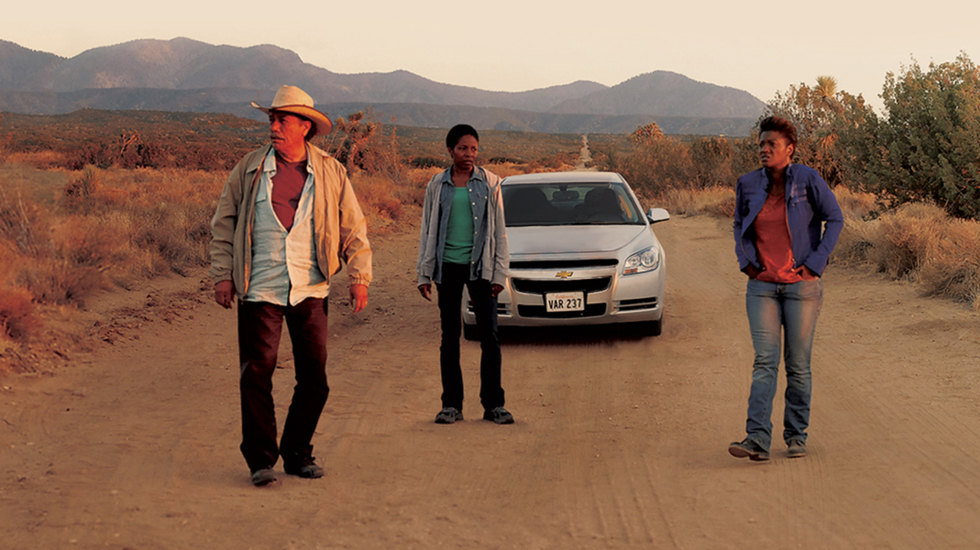
BY ZACHARY WIGON |
Indie Master John Sayles Discusses Genre And His Latest, 'Go For Sisters'
John Sayles is as much a godfather of contemporary American indie cinema as John Cassavetes. His latest film, 'Go For Sisters,' cleverly blends a character study with genre elements.

One of the pioneers of American independent cinema, John Sayles is a fascinating figure to reflect upon - as well as to refer to, as the industry barrels forward with innovations coming at a breathtaking pace. Famously financing his own films (at times) with the proceeds from his for-hire Hollywood script doctoring gigs, Sayles has turned out some of the most seminal indies of the modern era (Lone Star, Passion Fish) without ever conceding to industry pressures or demands.
His latest film, Go For Sisters, is no exception. Working cleverly within the buddy road movie genre (with plenty of detective story thrown in, for good measure), Go For Sisters finds Sayles exploiting the commercial and entertaining aspects of established Hollywood genres toward his own ends, enabling him to capture the audience's attention so that he may take them deep into a much more nuanced and intimate story. Go For Sisters is ostensibly a mystery about two old friends, Bernice (LisaGay Hamilton) and Fontayne (Yolanda Ross), who enlist the help of an ex-cop (Edward James Olmos) to go down to Mexico with them so that he may help them find Bernice's kidnapped son.
While the film works as a mystery, probing the criminal element of various Mexican locales with patient observation, it's ultimately a character study about Bernice and Fontayne, two old friends who had lost touch over the years, only to be reunited by the fact that Fontayne, a recent parolee, has been given Bernice as her parole officer.
The film's interplay between genre elements and elements more indicative of a quiet indie drama makes for fascinating viewing, and showcases Sayles's mastery of quite varied forms of storytelling, disparate forms he carefully unites into a cohesive whole. I spoke with Sayles recently about the film.
Tribeca: I think titles get discussed all too infrequently, and I really enjoyed the title of this film. What do you think makes for a good title?
John Sayles: Every once in a while you get lucky and you get a great title, one that's kind of iconic. I think Sex, Lies and Videotape - I mean, people wanted to see that movie knowing nothing about it, it's a great title. I think Lone Star is a great title. Go For Sisters is a phrase that, when I was a kid, people were so tight that you said they could go for sisters or go for brothers. It's actually not a great title in some ways, because when people hear it for the first time, sometimes they ask, "So are they sisters who are gofers?" Aurally, it doesn't always break down to make sense, but once you know the movie, it makes total sense.
I've two or three times made movies where we didn't have a title while we were making the movie - Passion Fish, Brother From Another Planet - and I actually had a contest, in the case of Passion Fish, for what the title of the film should be among the crew and cast. Titles are tough. All through this film I was trying to think of a better title, but I never did. I like the title, but it's not iconic.
You always have to be aware of what people are expecting, and then you can either subvert it or satisfy it, and move on to the next thing.
Tribeca: You mention that some people might be confused when they hear the title at first, and it makes me think about something peripherally related - your storytelling is one where there's a lot of respect for the audience, you don't beat the audience over the head with what everything means, directly. How do you approach dealing with the audience?
John Sayles: Well, some of it is using genre rather than totally surrendering to genre. If you're making a pure genre film you really have to surrender to all its rules and give the payoff when it's expected, but if you're using genre you can play with the structure and explore something that's more experiential than plot-driven. There is a plot in Go For Sisters and it's important, but it's really about three people looking for redemption. It's a psychological and spiritual journey as much as a physical journey. But it is a road movie about getting someone out of a tough situation, so that's the genre aspect.
Certainly, Lone Star has some genre elements to it, some familiar Western elements. Matewan is structured very much like a Western, even though it's a labor film. You just don't want it to be the kind of corporate genre experience where everyone knows where it's leading, and it's all about the special effects, or seeing an actor who's hot at the moment doing that we've seen many times before. Tribeca: Here, you use genre as a way in to the audience's mind - it's like genre is your way in to get us hooked, but it's really just the frame upon which the real story is hung.
Tribeca: Here, you use genre as a way in to the audience's mind - it's like genre is your way in to get us hooked, but it's really just the frame upon which the real story is hung.
John Sayles: I think it's important to have structure. Even the best of the Marx brothers movies had some kind of structure - it was important for them to have structure so they could be anarchic, so they could have something to be anarchic against. Some of it is about having a decent structure that moves you forward, so you know what happens next, either emotionally or in plot terms. Once that is in place, then you really think about, what's the character arc? How many characters can we handle? A certain amount of it is the way I use music.
I've worked with Mason Dering on seventeen of my eighteen features, and one thing he does is, he makes suggestive music, but not music that tells you how to feel. It's there to bring the acting out, not cover over the acting. That's something that people who only see mainstream movies are a little unsettled by - the lack of music, or the way music is used. It's experiential. So much of acting, of storytelling, is about decisions the characters make - is there a right thing to do?
Something that I think is different about our movies is, they're not heroic - they may act heroically for a moment, but that doesn't mean they're always going to act heroically. They're often in situations where there's not a right path to follow - both paths have their problems, and are morally complex. One thing movies have done often from the early silent films is giving us good guys and bad guys, white hats and black hats. When you get into those gray areas, which is most of real life, you're dealing with something that requires a more complex style of storytelling.
I think the staple of all these entertainment mediums is knowing who the good guys are, knowing who the bad guys are, and seeing the good guys win.
Tribeca: Do you think cinema's focus on good and bad, in simplistic terms, is tied to the cinematic medium in some way?
John Sayles: It's the staple of melodrama. There certainly were fictional melodramas and theater melodramas, and that led directly into cinema, film melodrama. I think fiction transcended melodrama fairly quickly, many years before stage or film did. Theater got more complex, and eventually movies caught up, but that doesn't mean that melodrama is dead.
I think the staple of all these entertainment mediums is knowing who the good guys are, knowing who the bad guys are, and seeing the good guys win. That's very satisfying on a certain level. If you look at contemporary life, there aren't many situations that are like that. Even a cop's life is a lot more complex than a good guy and bad guy thing, and I think that's something that's been reflected in a lot of the movies made in the past twenty years.
Tribeca: When you conceive of a film like Go For Sisters, are you trying to meet a kind of audience expectation in your own way?
John Sayles: You always have to be aware of what people are expecting, and then you can either subvert it or satisfy it, and move on to the next thing. I don't think this would be a satisfying movie if they just ended up in the desert and never found out what happened to Bernice's son. There is closure in the film. I've done movies where there hasn't been closure. I made a movie called Limbo, and the title is a consumer warning! A third of the audience loved the ending, a third maybe got it the next day, and a third still can't stand it. That was a movie that was about something different.
You just have to always be aware of audience expectations. People aren't consistent. They don't always necessarily act the same way. The first, I think, important thing in this film is that this woman, Bernice, starts out as a hardass, a shill for the official story, but this hardass parole officer - as soon as something happens to her son, she realizes, I understand the justice system and it doesn't have anything good waiting for my son. I'll break every law in the book to get him out of this jam.
Go For Sisters hits select theaters in New York and Los Angeles this weekend.

